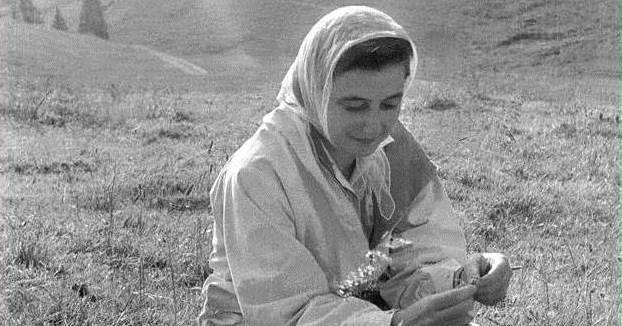
The discovery of Jesus Forsaken
 During a meeting in 2000, Chiara recalled her first “discovery” of Jesus Forsaken: “We understood something new about Him through an event that happened in January 1944. Through a particular circumstance, we came to realize that the greatest pain Jesus had suffered – and therefore the moment of His greatest love for us – was when He experienced the abandonment of the Father: ‘My God, my God, why have you forsaken me?’ (Mt 18:20). It touched us deeply. Being so young, so enthusiastic, but especially because of the grace of God, we felt urged to choose Him precisely in His abandonment, as the way to achieve our ideal of love. From that moment on we saw His face everywhere.” Another key moment in the understanding of this “mystery of suffering-love” was in the summer of 1949. Igino Giordani went to visit Chiara Lubich who had gone for a period of rest in the Valle di Primiero in the mountains of Trent, Italy. This small group of first followers that accompanied her was living with intensity the Gospel passage about the abandonment of Jesus. And those days in the mountains turned out to be days of such intense light that when it came time for them to leave their “little Tabor” and return to the city, Chiara quickly penned a text that has now become famous “I have only one spouse on earth, Jesus Forsaken. . . I will go through the world searching for him in every moment of my life.” Many years later she would explain: “Right from the start we knew that there was another side to it all, that the tree had its roots. The Gospel covers you in love, but it demands everything from you as well. ‘If the grain of wheat, which falls to the ground, does not die,’ we read in John, ‘it remains alone; but if it dies, it produces much fruit’ (cf Jn 12:24). This is personified in Jesus Forsaken, and the fruit that he bore was humankind’s Redemption. Jesus Forsaken! Who had experienced within himself the separation of humankind from God and from each other, and had experienced the Father far from him, was seen by us not only in all of our personal sufferings, which were never lacking, or in the sufferings of our neighbors who often were all alone, abandoned and forgotten, but also in all the divisions, the traumas, the splits, the mutual indifference whether large or small: within families, among generations, between rich and poor, at times in the Church itself; later, among the different Churches; and then, among religions and between believers and those who have no religious faith at all.” “But all of these lacerations,” Chiara continued, “never frightened us. Rather, for love of Jesus Forsaken, they attracted us. And he is the one who taught us how to confront them, how to live them, how to overcome them when, after the abandonment, he placed his spirit in the Father’s hands: ‘Father, into your hands I commend my spirit’ (Lk 23:46). And this is how he offered humankind the possibility of being recomposed within itself and with God, and he us showed how. He was the one who recomposed unity among us each time it was cracked. He became our only Spouse. And our life together with such a Spouse was so rich and fruitful that it pushed me to write a book, as a love letter, a song, a joyful thanksgiving song to Him.”
During a meeting in 2000, Chiara recalled her first “discovery” of Jesus Forsaken: “We understood something new about Him through an event that happened in January 1944. Through a particular circumstance, we came to realize that the greatest pain Jesus had suffered – and therefore the moment of His greatest love for us – was when He experienced the abandonment of the Father: ‘My God, my God, why have you forsaken me?’ (Mt 18:20). It touched us deeply. Being so young, so enthusiastic, but especially because of the grace of God, we felt urged to choose Him precisely in His abandonment, as the way to achieve our ideal of love. From that moment on we saw His face everywhere.” Another key moment in the understanding of this “mystery of suffering-love” was in the summer of 1949. Igino Giordani went to visit Chiara Lubich who had gone for a period of rest in the Valle di Primiero in the mountains of Trent, Italy. This small group of first followers that accompanied her was living with intensity the Gospel passage about the abandonment of Jesus. And those days in the mountains turned out to be days of such intense light that when it came time for them to leave their “little Tabor” and return to the city, Chiara quickly penned a text that has now become famous “I have only one spouse on earth, Jesus Forsaken. . . I will go through the world searching for him in every moment of my life.” Many years later she would explain: “Right from the start we knew that there was another side to it all, that the tree had its roots. The Gospel covers you in love, but it demands everything from you as well. ‘If the grain of wheat, which falls to the ground, does not die,’ we read in John, ‘it remains alone; but if it dies, it produces much fruit’ (cf Jn 12:24). This is personified in Jesus Forsaken, and the fruit that he bore was humankind’s Redemption. Jesus Forsaken! Who had experienced within himself the separation of humankind from God and from each other, and had experienced the Father far from him, was seen by us not only in all of our personal sufferings, which were never lacking, or in the sufferings of our neighbors who often were all alone, abandoned and forgotten, but also in all the divisions, the traumas, the splits, the mutual indifference whether large or small: within families, among generations, between rich and poor, at times in the Church itself; later, among the different Churches; and then, among religions and between believers and those who have no religious faith at all.” “But all of these lacerations,” Chiara continued, “never frightened us. Rather, for love of Jesus Forsaken, they attracted us. And he is the one who taught us how to confront them, how to live them, how to overcome them when, after the abandonment, he placed his spirit in the Father’s hands: ‘Father, into your hands I commend my spirit’ (Lk 23:46). And this is how he offered humankind the possibility of being recomposed within itself and with God, and he us showed how. He was the one who recomposed unity among us each time it was cracked. He became our only Spouse. And our life together with such a Spouse was so rich and fruitful that it pushed me to write a book, as a love letter, a song, a joyful thanksgiving song to Him.”
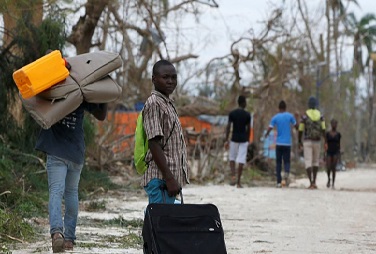
Brazil: Young Continental Missionaries
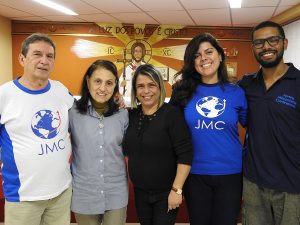 The words Pope Francis pronounced at the World Youth Day in Rio de Janeiro in 2013, “Go out and serve without fear,” triggered in the youths of the Focolare, the desire to take up the challenge. And so, those of the city of Juiz de Fora (500,000 inhabitants), in the Brazilian state of Minas Gerais, launched a project that gathers the youths of different charisms. “The aim is to testify to unity in the diversities of the Church,” they said, “and be disciples of Christ and missionaries, in line with the invitation of the Latin American bishops to all Christians. Of course, there are difficulties, but this does not discourage us.” It was Archbishop Gil Antonio Moreira who gave the group – of 60 – the name of “Young Continental Missionaries”. “We come from different spiritual experiences – they explained – Renewal in the Spirit, new Communities, parish groups and the Focolare Movement. The start of the mission consists in the personal consecration to God for a year, renewable for another year. And then there are three points that help set the compass: prayer, training and mission, and putting ourselves at the service of others.” F
The words Pope Francis pronounced at the World Youth Day in Rio de Janeiro in 2013, “Go out and serve without fear,” triggered in the youths of the Focolare, the desire to take up the challenge. And so, those of the city of Juiz de Fora (500,000 inhabitants), in the Brazilian state of Minas Gerais, launched a project that gathers the youths of different charisms. “The aim is to testify to unity in the diversities of the Church,” they said, “and be disciples of Christ and missionaries, in line with the invitation of the Latin American bishops to all Christians. Of course, there are difficulties, but this does not discourage us.” It was Archbishop Gil Antonio Moreira who gave the group – of 60 – the name of “Young Continental Missionaries”. “We come from different spiritual experiences – they explained – Renewal in the Spirit, new Communities, parish groups and the Focolare Movement. The start of the mission consists in the personal consecration to God for a year, renewable for another year. And then there are three points that help set the compass: prayer, training and mission, and putting ourselves at the service of others.” F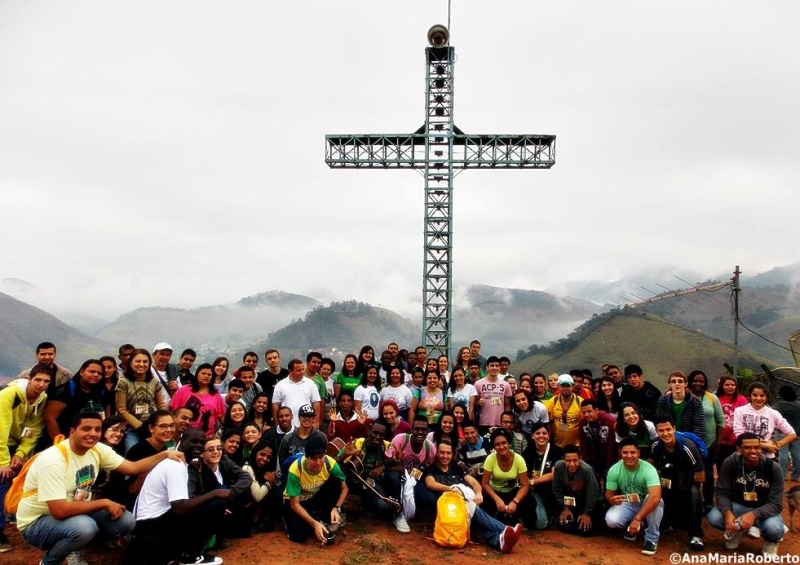 our years after the launch of the project, numerous missions have been undertaken in the parishes of the Juiz di Fora archdiocese, with a hundred visits to the families of the rural communities at the outskirts and violent districts of the city, the asylums and orphanages, and the rehabilitation centre for minors with criminal records. “We created socio-health programmes, as in the case of the battle against dengue (tropical disease), operating wherever there were the highest death rates. In particular, we worked to ensure hygiene in the environment, eliminating rubbish and dump sites that enhance the proliferation of mosquitoes that transmit the disease, but also informing the population through brochures and posters. At the moment we are carrying out special missions in Haiti and in the city of Obidos (State of Pará), in the Educational Centre for juvenile offenders and with the “cartoneros” (rubbish bin collectors of cardboard which is then recycled). We highlighted the importance of their work for the benefit of our great home: the planet Earth. We did not miss out in supporting the youth economically and psychologically, in particularly difficult situations. Furthermore, the “supportive Christmas” project enabled us to gather nonperishable food and other essential goods, that were then donated to a charitable institution.”
our years after the launch of the project, numerous missions have been undertaken in the parishes of the Juiz di Fora archdiocese, with a hundred visits to the families of the rural communities at the outskirts and violent districts of the city, the asylums and orphanages, and the rehabilitation centre for minors with criminal records. “We created socio-health programmes, as in the case of the battle against dengue (tropical disease), operating wherever there were the highest death rates. In particular, we worked to ensure hygiene in the environment, eliminating rubbish and dump sites that enhance the proliferation of mosquitoes that transmit the disease, but also informing the population through brochures and posters. At the moment we are carrying out special missions in Haiti and in the city of Obidos (State of Pará), in the Educational Centre for juvenile offenders and with the “cartoneros” (rubbish bin collectors of cardboard which is then recycled). We highlighted the importance of their work for the benefit of our great home: the planet Earth. We did not miss out in supporting the youth economically and psychologically, in particularly difficult situations. Furthermore, the “supportive Christmas” project enabled us to gather nonperishable food and other essential goods, that were then donated to a charitable institution.”  The Young Continental Missionaries began to settle in other places over time, and reached Obidos (State of Pará), the heart of the Amazons. “Coming in contact with the people, we saw that the call to missionary life echoed in them, and a variety of vocations came to the fore.” Surpassing the confines of Brazil, they even reached Haiti. Last 17 July, a group of six people of the archdiocese of Juiz de Fora and their archbishop set out for Haiti. The situation of that country is really challenging, 7 years after the earthquake that had devastated it: in just 24 seconds more than 300,000 buildings had collapsed among civil and institutional structures, causing the death of 200,000 people. With its magnitude of 7.2 on the Richter scale, it was the worst earthquake registered in the Americas. “Haiti is the poorest periphery of Latin America. And that is where, “Bishop Gil Antonio Moreira wrote, “my eyes and those of the Continental Missionary Youth are focusing on. With great joy we shall go to serve without fear, because the reason, and our goal, is Jesus Christ.” The youth of the Focolare concluded by saying: “Paradoxically, what assures us that we are on the right path are the difficulties we encounter, and in which we try to love a countenance of Jesus Forsaken, He is the secret of our joy and the fruits we have seen.”
The Young Continental Missionaries began to settle in other places over time, and reached Obidos (State of Pará), the heart of the Amazons. “Coming in contact with the people, we saw that the call to missionary life echoed in them, and a variety of vocations came to the fore.” Surpassing the confines of Brazil, they even reached Haiti. Last 17 July, a group of six people of the archdiocese of Juiz de Fora and their archbishop set out for Haiti. The situation of that country is really challenging, 7 years after the earthquake that had devastated it: in just 24 seconds more than 300,000 buildings had collapsed among civil and institutional structures, causing the death of 200,000 people. With its magnitude of 7.2 on the Richter scale, it was the worst earthquake registered in the Americas. “Haiti is the poorest periphery of Latin America. And that is where, “Bishop Gil Antonio Moreira wrote, “my eyes and those of the Continental Missionary Youth are focusing on. With great joy we shall go to serve without fear, because the reason, and our goal, is Jesus Christ.” The youth of the Focolare concluded by saying: “Paradoxically, what assures us that we are on the right path are the difficulties we encounter, and in which we try to love a countenance of Jesus Forsaken, He is the secret of our joy and the fruits we have seen.”
Christian-Hindu Convention
See Program of the convention
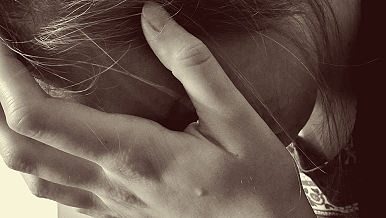
Gospel into Action: take up your cross and follow Him
The unexpected We were expecting our first child. Immediately after this news came an unexpected discovery: I had a small nodule in my breast. The tests showed that it was cancer. For me and for my husband, who is a physician, it was a terrible blow. Three days after the visit with a specialist, I had an operation. In his opinion, keeping the baby was an aggravating factor: we should have immediately proceeded with a therapeutic abortion in order to start chemotherapy. We didn’t want to give up. Trusting in God, we consulted other doctors, seeking an alternative solution. In the end we decided to have a Cesarean section in the seventh month of pregnancy, when the baby would be perfectly able to survive. Only afterwards would I start the chemotherapy and radiation. Since then, 8 years have passed and we are expecting our third child. M. D. – France The stranger One day I was in the car with a man who had asked me for a ride. It was noon, and I asked him where he was going to have lunch. He answered, “I haven’t got a penny, and I have no idea how I’m going to eat.” I was overcome with suspicions and indifference. But I pushed these thoughts away, saying to Jesus in my heart: “It doesn’t matter who he is, what I do for him, I do for you.” I fished in my pocket and gave him all I had, adding, so as not to humiliate him, “Pay me back whenever you can.” A few days later, I received an envelope from a client with the exact amount that I had given that stranger inside. For me, this situation was the confirmation that the Gospel is true. A. G. – Italy A family party We had an idea, with several other families that are friends of ours, to organize a party for the Senegalese in our city. We were all committed to making these young immigrants feel the warmth of the family. Afterwards, one of them commented: “Everything went beyond our expectations. No one made us feel different and because of this, we felt at home. We have the same God who makes us brothers and sisters.” The party had finished, but the friendship continues. G. L. – Italy We have a Father By chance, we met again after many years. I hadn’t seen her since my high school years. Although she had a degree in mathematics, after a very sad sequence of events she now found herself in my city without even a penny, living the life of a beggar. She was desperate, and I listened to her story. At that moment, I had nothing to give her, but I promised to help her: I told her she must be certain of this, because, “We have a Father in heaven.” We made plans to meet again the next day. In the meantime, with the help of some others, I found a temporary accommodation for her and gathered some money: at least enough to live on, to be able to eat and to bathe. After two days she contacted me again, and returning the money, she explained that she had been offered a job in a place that also provided room and board. She added, “I have to thank you, not only for the money, but because that day you gave me back what I needed most: the hope and the certainty that I have a Father who cares for me.” Franca – Italy
We were expecting our first child. Immediately after this news came an unexpected discovery: I had a small nodule in my breast. The tests showed that it was cancer. For me and for my husband, who is a physician, it was a terrible blow. Three days after the visit with a specialist, I had an operation. In his opinion, keeping the baby was an aggravating factor: we should have immediately proceeded with a therapeutic abortion in order to start chemotherapy. We didn’t want to give up. Trusting in God, we consulted other doctors, seeking an alternative solution. In the end we decided to have a Cesarean section in the seventh month of pregnancy, when the baby would be perfectly able to survive. Only afterwards would I start the chemotherapy and radiation. Since then, 8 years have passed and we are expecting our third child. M. D. – France The stranger One day I was in the car with a man who had asked me for a ride. It was noon, and I asked him where he was going to have lunch. He answered, “I haven’t got a penny, and I have no idea how I’m going to eat.” I was overcome with suspicions and indifference. But I pushed these thoughts away, saying to Jesus in my heart: “It doesn’t matter who he is, what I do for him, I do for you.” I fished in my pocket and gave him all I had, adding, so as not to humiliate him, “Pay me back whenever you can.” A few days later, I received an envelope from a client with the exact amount that I had given that stranger inside. For me, this situation was the confirmation that the Gospel is true. A. G. – Italy A family party We had an idea, with several other families that are friends of ours, to organize a party for the Senegalese in our city. We were all committed to making these young immigrants feel the warmth of the family. Afterwards, one of them commented: “Everything went beyond our expectations. No one made us feel different and because of this, we felt at home. We have the same God who makes us brothers and sisters.” The party had finished, but the friendship continues. G. L. – Italy We have a Father By chance, we met again after many years. I hadn’t seen her since my high school years. Although she had a degree in mathematics, after a very sad sequence of events she now found herself in my city without even a penny, living the life of a beggar. She was desperate, and I listened to her story. At that moment, I had nothing to give her, but I promised to help her: I told her she must be certain of this, because, “We have a Father in heaven.” We made plans to meet again the next day. In the meantime, with the help of some others, I found a temporary accommodation for her and gathered some money: at least enough to live on, to be able to eat and to bathe. After two days she contacted me again, and returning the money, she explained that she had been offered a job in a place that also provided room and board. She added, “I have to thank you, not only for the money, but because that day you gave me back what I needed most: the hope and the certainty that I have a Father who cares for me.” Franca – Italy
